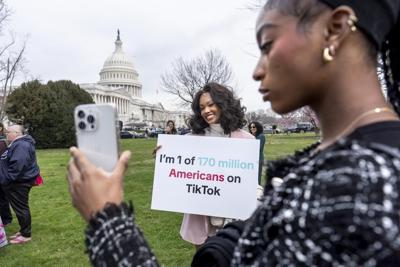WASHINGTON (AP) — The young voices in the messages left for North Carolina Sen. Thom Tillis were laughing, but the words were ominous.
“OK, listen, if you ban TikTok I will find you and shoot you,” one said, giggling and talking over other young voices in the background. “I’ll shoot you and find you and cut you into pieces.” Another threatened to kill Tillis, and then take their own life.
Tillis’s office says it has received around 1,000 calls about TikTok since the this month that if its China-based owner doesn’t sell its stake. TikTok has been urging its users — many of whom are young — to call their representatives, even providing an easy link to the phone numbers. “The government will take away the community that you and millions of other Americans love,” read one pop-up message from the company when users opened the app.
Tillis, who supports the House bill, reported the call to the police. “What I hated about that was it demonstrates the enormous influence social media platforms have on young people,” he said in an interview.
While more aggressive than most, TikTok’s extensive lobbying campaign is the latest attempt by the tech industry to head off any new legislation — and it's a fight the industry usually wins. For years Congress has that would protect users’ privacy, protect children from online threats, make companies more liable for their content and put loose guardrails around artificial intelligence, among other things.
“I mean, it’s almost embarrassing,” says Senate Intelligence Committee Chairman Mark Warner, D-Va., a former tech executive who is also supporting the TikTok bill and has long tried to push his colleagues to regulate the industry. “I would hate for us to maintain our perfect zero batting average on tech legislation.”
Some see the TikTok bill as the best chance for now to regulate the tech industry and set a precedent, if a narrow one focused on just one company. President Joe Biden has said he would sign the House bill, which overwhelmingly passed 362-65 this month after a rare 50-0 committee vote moving it to the floor.
But it’s already running into roadblocks in the Senate, where there is little unanimity on the best approach to ensure that China doesn’t access private data from the app’s 170 million U.S. users or influence them through its algorithms.
Other factors are holding the Senate back. The tech industry is broad and falls under the jurisdiction of several different committees. Plus, the issues at play don't fall cleanly on partisan lines, making it harder for lawmakers to agree on priorities and how legislation should be written. Senate Commerce Committee Chairwoman Maria Cantwell, D-Wash., has so far been reluctant to embrace the TikTok bill, for example, calling for hearings first and suggesting that the Senate may want to rewrite it.
“We’re going through a process,” Cantwell said. “It’s important to get it right.”
Warner, on the other hand, says the House bill is the best chance to get something done after years of inaction. And he says that the threatening calls from young people are a good example of why the legislation is needed: “It makes the point, do we really want that kind of messaging being able to be manipulated by the Communist Party of China?”
Some lawmakers are worried that blocking TikTok could anger millions of young people who use the app, a crucial segment of voters in November's election. But Warner says "the debate has shifted” from talk of an outright ban a year ago to the House bill which would force TikTok, a wholly owned subsidiary of Chinese technology firm ByteDance Ltd., for the app to continue operating.
Vice President Kamala Harris, in a television interview that aired Sunday, acknowledged the popularity of the app and that it has become an income stream for many people. She said the administration does not intend to ban TikTok but instead deal with its ownership. “We understand its purpose and its utility and the enjoyment that it gives a lot of folks,” Harris told ABC's ”This Week."
Republicans are divided. While most of them support the TikTok legislation, others are wary of overregulation and the government targeting one specific entity.
“The passage of the House TikTok ban is not just a misguided overreach; it’s a draconian measure that stifles free expression, tramples constitutional rights, and disrupts the economic pursuits of millions of Americans,” Kentucky Sen. Rand Paul posted on X, formerly Twitter.
Hoping to persuade their colleagues to support the bill, Democratic Sen. Richard Blumenthal of Connecticut and Republican Sen. Marsha Blackburn of Tennessee have called for intelligence agencies to declassify information about TikTok and China’s ownership that has been provided to senators in classified briefings.
“It is critically important that the American people, especially TikTok users, understand the national security issues at stake,” the senators said in a joint statement.
Blumenthal and Blackburn have separate legislation they have been working on for several years aimed at protecting children’s online safety, but the Senate has yet to vote on it. Efforts to regulate online privacy have also stalled, as has legislation to make technology companies more liable for the content they publish.
And an effort by Senate Majority Leader Chuck Schumer, D-N.Y., to quickly move legislation that would has yet to show any results.
Schumer has said very little about the TikTok bill or whether he might put it on the Senate floor.
“The Senate will review the legislation when it comes over from the House,” was all he would say after the House passed the bill.
South Dakota Sen. Mike Rounds, a Republican who has worked with Schumer on the artificial intelligence effort, says he thinks the Senate can eventually pass a TikTok bill, even if it's a different version. He says the classified briefings “convinced the vast majority of members” that they have to address the collection of data from the app and TikTok's ability to push out misinformation to users.
“I think it’s a clear danger to our country if we don’t act,” he said. “It does not have to be done in two weeks, but it does have to be done.”
Rounds says he and Schumer are still holding regular meetings on artificial intelligence, as well, and will soon release some of their ideas publicly. He says he’s optimistic that the Senate will eventually act to regulate the tech industry.
“There will be some areas that we will not try to get into, but there are some areas that we have very broad consensus on,” Rounds says.
Tillis says senators may have to continue laying the groundwork for a while and educating colleagues on why some regulation is needed, with an eye toward passing legislation in the next Congress.
“It can’t be the wild, wild west,” Tillis said.
___
Associated Press writer Stephen Groves contributed to this report.








































